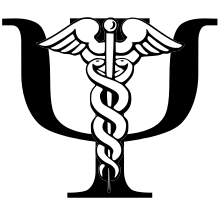Portal:Psychiatry
The Psychiatry Portal Psychiatry is the medical specialty devoted to the diagnosis, prevention, and treatment of deleterious mental conditions. These include various matters related to mood, behaviour, cognition, perceptions, and emotions. Initial psychiatric assessment of a person begins with creating a case history and conducting a mental status examination. Physical examinations, psychological tests, and laboratory tests may be conducted. On occasion, neuroimaging or other neurophysiological studies are performed. Mental disorders are diagnosed in accordance with diagnostic manuals such as the International Classification of Diseases (ICD), edited by the World Health Organization (WHO), and the Diagnostic and Statistical Manual of Mental Disorders (DSM), published by the American Psychiatric Association (APA). The fifth edition of the DSM (DSM-5), published in May 2013, reorganized the categories of disorders and added newer information and insights consistent with current research. Treatment may include psychotropics (psychiatric medicines), interventional approaches and psychotherapy, and also other modalities such as assertive community treatment, community reinforcement, substance-abuse treatment, and supported employment. Treatment may be delivered on an inpatient or outpatient basis, depending on the severity of functional impairment or risk to the individual or community. Research within psychiatry is conducted on an interdisciplinary basis with other professionals, such as epidemiologists, nurses, social workers, occupational therapists, and clinical psychologists. (Full article...) Selected article The syndrome is named after the Austrian pediatrician Hans Asperger who, in 1944, studied and described children in his practice who lacked nonverbal communication skills, demonstrated limited empathy with their peers, and were physically clumsy. The modern conception of Asperger syndrome came into existence in 1981 and went through a period of popularization, becoming standardized as a diagnosis in the early 1990s. Many questions and controversies remain about aspects of the disorder. There is doubt about whether it is distinct from high-functioning autism (HFA); partly because of this, its prevalence is not firmly established. (Full article...) Selected image Windows of a person showing symptoms of paranoia and persecutory delusions, symptoms of schizophrenia image credit: Schizophrenic window WikiProjectsSelected biography Rush signed the Declaration of Independence and attended the Continental Congress. He served as Surgeon General in the Continental army, and was blamed for criticising George Washington. Later in life, Rush became a professor of chemistry, medical theory, and clinical practice at the University of Pennsylvania. As a leading physician, Rush had a major impact on the emerging medical profession. As an Enlightenment intellectual, he was committed to organizing all medical knowledge around explanatory theories, rather than rely on empirical methods. Rush argued that illness was the result of imbalances in the body's physical system and was caused by malfunctions in the brain. His approach prepared the way for later medical research, but Rush himself undertook none of it. He promoted public health by advocating clean environment and stressing the importance of personal and military hygiene. His study of mental disorder made him one of the founders of American psychiatry. (Full article...) General imagesThe following are images from various psychiatry-related articles on Wikipedia. Related portalsTopicsSubcategoriesAssociated WikimediaThe following Wikimedia Foundation sister projects provide more on this subject:
Discover Wikipedia using portals |

































